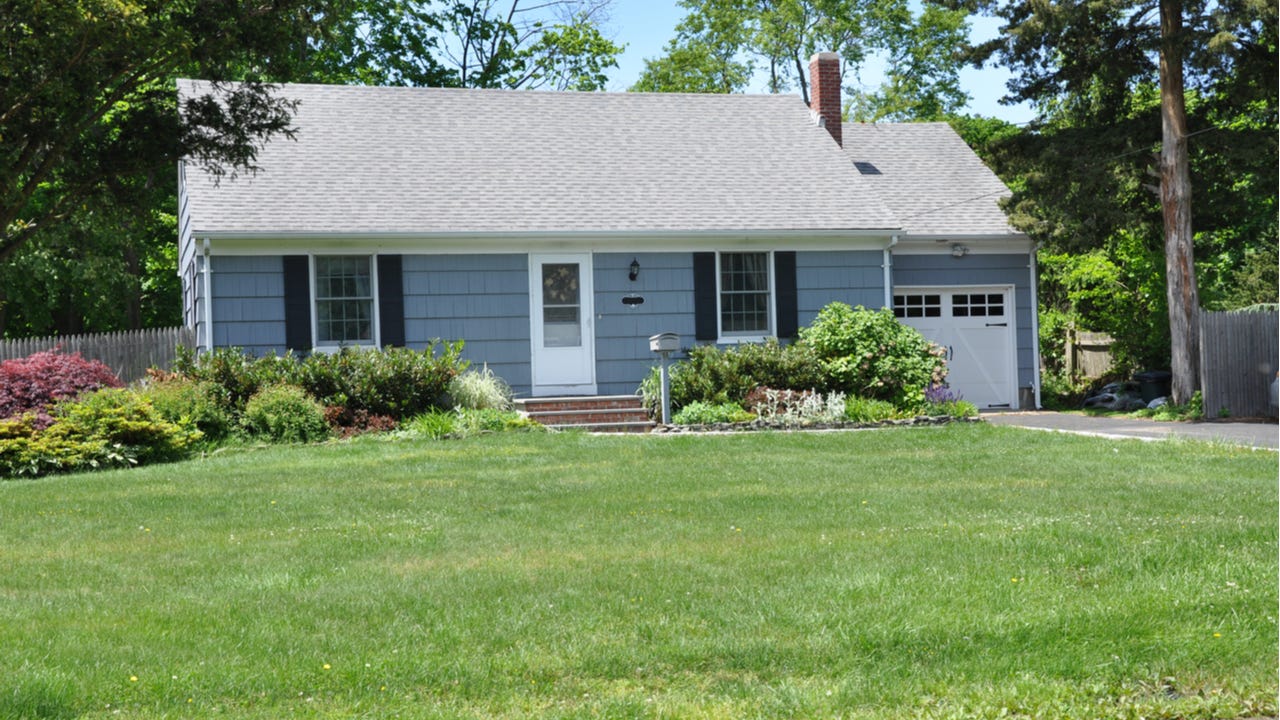
How We Make Money
The businesses whose offers you see on this website pay us. Unless our mortgage, home equity, and other home lending products are specifically prohibited by law, this compensation may have an impact on how and where products appear on this website, including, for example, the order in which they may appear within the listing categories. However, this payment has no bearing on the content we post or the user reviews you see here. We don’t include the range of businesses or loan options that you might have.

Our goal at Bankrate is to assist you in making more informed financial decisions. Although we follow stringent guidelines, this post might mention goods from our partners. Heres an explanation for . Bankrate logo.
Bankrate was established in 1976 and has a long history of assisting consumers in making wise financial decisions. We’ve upheld this reputation for more than 40 years by assisting people in making sense of the financial decision-making process and providing them with confidence regarding their next course of action.
You can rely on Bankrate to prioritize your interests because we adhere to a rigorous editorial policy. All of the content we publish is objective, accurate, and reliable because it is written by highly qualified professionals and edited by subject matter experts.
In order to give you peace of mind when making decisions as a buyer and homeowner, our mortgage reporters and editors concentrate on the topics that matter most to consumers: the newest rates, the greatest lenders, navigating the homebuying process, refinancing your mortgage, and more. Bankrate logo.
You can rely on Bankrate to prioritize your interests because we adhere to a rigorous editorial policy. Our team of distinguished editors and reporters produces truthful and precise content to assist you in making wise financial decisions.
We value your trust. Our goal is to give readers reliable, unbiased information, and we have established editorial standards to make sure that happens. Our reporters and editors carefully verify the accuracy of the editorial content they produce, making sure you’re reading true information. We keep our editorial staff and advertisers apart with a firewall. No direct payment from our advertisers is given to our editorial staff.
The editorial staff at Bankrate writes for YOU, the reader. Providing you with the best guidance possible to enable you to make wise personal finance decisions is our aim. We adhere to stringent policies to guarantee that advertisers have no influence over our editorial content. Advertisers don’t pay our editorial staff directly, and we carefully fact-check all of our content to guarantee accuracy. Thus, you can be sure that the information you’re reading, whether it’s an article or a review, is reliable and reputable. Bankrate logo.
How we make money
You have money questions. Bankrate has answers. For more than 40 years, our professionals have assisted you in managing your finances. We always work to give customers the professional guidance and resources they need to be successful on their financial journey.
Because Bankrate adheres to strict editorial standards, you can rely on our content to be truthful and accurate. Our team of distinguished editors and reporters produces truthful and precise content to assist you in making wise financial decisions. Our editorial team produces factual, unbiased content that is unaffected by our sponsors.
By outlining our revenue streams, we are open and honest about how we are able to provide you with high-quality material, affordable prices, and practical tools.
Bankrate. com is an independent, advertising-supported publisher and comparison service. We receive payment when you click on specific links that we post on our website or when sponsored goods and services are displayed on it. Therefore, this compensation may affect the placement, order, and style of products within listing categories, with the exception of our mortgage, home equity, and other home lending products, where legal prohibitions apply. The way and location of products on this website can also be affected by other variables, like our own unique website policies and whether or not they are available in your area or within your own credit score range. Although we make an effort to present a variety of offers, Bankrate does not contain details about all financial or credit products or services.
- The removal of FHA mortgage insurance is dependent upon a number of variables, including the date of loan origination and the amount of your down payment.
- If your loan was obtained prior to 2000, you will be required to pay FHA mortgage insurance premiums for the duration of the loan.
- In some circumstances, loans made after 2000 may be eligible to have their FHA mortgage insurance removed.
You may be wondering how to stop paying the monthly FHA mortgage insurance premium (MIP) if you have an FHA loan.
FHA loans require mortgage insurance premiums regardless of the amount of the down payment, in contrast to conventional loans that only impose PMI when the down payment is less than 20%. Canceling them can be challenging, but not impossible. Here’s how to avoid paying premiums for FHA mortgage insurance (and when you can’t).
Step-by-step guide to removing FHA mortgage insurance
It is not sufficient to know how to remove MIPs from an FHA loan. Additionally, the loan you have to be eligible for this option According to the loan origination date, eligibility for the removal of FHA mortgage insurance is as follows:
- You are unable to waive your FHA mortgage insurance premiums if your mortgage was originated between July 1991 and December 2000. For the duration of the loan, you must continue making payments to them or refinance into a new loan.
- When your loan-to-value ratio (LTV) reaches 78 percent, if you obtained your loan between January 2001 and June 3, 2013, your monthly interest payment (MIP) will be terminated.
- Your MIP will be eliminated after 11 years if your loan was obtained after June 3, 2013, and you made a down payment of at least 10%. You will have to pay MIPs until your mortgage is paid off in full if your down payment is less than 10%.
According to Alan Aldinger, vice president of PNC Bank’s media relations, “a number of factors come into play when determining whether or not the FHA mortgage insurance can be canceled.” The primary determinant is the date on which the borrower’s current FHA loan case number was assigned. ”.
Put another way, depending on when you obtained your loan, how much of it you’ve paid off, and how much of a down payment you made, you might be qualified for the removal of FHA mortgage insurance.
Look up your mortgage loan origination date to see which FHA MIP removal rules apply to you and what you can qualify for.
Understand your options
If you are eligible to have MIP removed from an FHA loan, you can work with your lender to do so after fulfilling the requirements. You have that choice for loans that were originated between January 2001 and June 3, 2013, as soon as you reach the 78 percent loan-to-value ratio. After 11 years, that becomes an option for borrowers who obtained their loan after June 3, 2013, and made a down payment of more than 10%. To be eligible in either scenario, you must have made your payments on time.
If you fit into any of those categories, speak with your lender about waiving your FHA mortgage insurance premium.
Refinance to a conventional loan
It’s time to consider refinancing your FHA loan to a conventional loan if you and your lender decide you cannot remove the MIP. Here are a few key considerations to make before refinancing:
- Credit score: If your credit score has improved since you obtained your FHA loan, you may be eligible for a conventional loan with a lower interest rate and no private mortgage insurance if your loan-to-value ratio is 80% or less.
- LTV ratio: The value of your house is important, in addition to how much you’ve paid on your current FHA loan. Is the increased value of your home today the result of recent major renovations or rising property values?
- Closing costs – Refinancing isn’t free. Closing costs for the new loan will need to be paid, and they can total thousands of dollars. Although it will be satisfying to no longer have to pay the annual MIP, make sure refinancing will ultimately save you money and be worthwhile. Bankrate’s mortgage refinance calculator can help you decide.
Contact your lender
Speak with your lender or servicer if you meet the requirements for the removal of FHA mortgage insurance (your loan is eligible based on the origination date and you’ve reached the life-of-loan benchmark or the necessary LTV ratio). They can talk to you about the next steps to terminate the MIP.
If your loan isn’t eligible, still contact your lender. They can explore your refinance options with you. Note that you can achieve your goal of eliminating FHA mortgage insurance by refinancing with any conventional mortgage; you are not required to do so with your current lender. To obtain the best refinance rate, you should compare refinance options with at least three different lenders.
Should you remove MIP from an FHA loan?
It usually makes sense to remove MIP from an FHA loan if you are qualified to do so after you have enough equity in your house. Simply put, it’s one less payment you’ll have to make.
There are a few more factors to take into account, though, if you’re thinking about refinancing only to get rid of MIP. For starters, you might still be required to pay mortgage insurance based on your equity level. If you have less than 20 percent equity in your home when taking out a conventional loan, PMI is typically needed (i e. , an LTV ratio of less than 80%) — and that PMI might cost more than your FHA MIP. Additionally, you’ll have to reapply for a loan and pay closing costs.
Refinancing can lower your monthly mortgage payments, which could offset the higher premiums. This is a benefit. Plus, PMI is easier to get rid of. After you reach 20 percent equity on a conventional loan, you can ask to have your PMI cancelled. Depending on when you obtained your FHA loan and how much you put down, this could be a significant benefit. Star Alt.
Remember that your loan-to-value (LTV) ratio must drop to 78 percent, or when your mortgage balance is equal to 78 percent of the purchase price of your home, in order for your mortgage lender or servicer to automatically terminate PMI under the Homeowners Protection Act of 1998.
FAQ about FHA mortgage insurance removal
- Potentially, if you explore an FHA streamline refinance. A premium reduction could result in lower MIPs if you refinance at a lower rate than you currently have, even though it won’t guarantee the removal of FHA MIPs.
- No. The removal of FHA mortgage insurance is completely dependent on the loan-to-value ratio, the date of the loan, and the amount of the down payment.
- That is dependent upon the amount of equity you own in your home. With a conventional mortgage, private mortgage insurance is not required if you have 20% equity or more.




FAQ
Can I remove PMI from an FHA loan?
Put simply: if you have an FHA loan with a term longer than 2015 years, have been making payments for at least 5 years, and have an LTV ratio of less than or equal to that, PMI may be removed from the loan.
Can I cancel PMI if my home value increases?
Yes. You might be qualified to seek a PMI cancellation if the value of your house rises as a result of improvements you make or because of general housing market trends. To confirm the new market value, you’ll probably need to pay for a home appraisal, but the expense may be well worth it if it saves you additional PMI payments.
Can PMI be removed without refinancing?
Yes. In general, your servicer is required to automatically terminate PMI on the day that your principal balance is scheduled to reach 78% of the original value of your home, even if you don’t ask them to. You must be up to date on your payments in order for your PMI to be cancelled on that date.
How long do you pay PMI on FHA loan?
While PMI is not necessary for FHA mortgage loans, an Up Front Mortgage Insurance Premium and a Mortgage Insurance Premium (MIP) must be paid in its place. The majority of FHA loans issued today will require MIP for either 11 years or the duration of the mortgage, depending on the specifics of your loan.
Read More :
https://www.bankrate.com/mortgages/remove-fha-mortgage-insurance/
https://www.rocketmortgage.com/learn/fha-mortgage-insurance-removal
